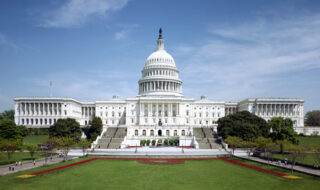February 19, 2021
Prior Years’ Victories in the Montana Legislature
2019 Session of the Montana Legislature
Tax Proposals Defeated
NFIB lobbied successfully at the House and Senate Tax committees to have bills killed that would increase taxes or would have created new taxes. These included a tax on fireworks, carbon taxes, luxury sales taxes, and local-option sales taxes.
Container Measures Stopped
NFIB stopped bills that would have limited the use of plastic straws in restaurants, prohibited the use of Styrofoam boxes in restaurants, placed a tax on plastic grocery bags.
Workers’ Compensation Premium Increases Blocked
As originally written, House Bill 658 called for financing the expansion of the state’s Medicaid program by levying a 2.75% tax on all workers’ compensation insurance written by the Montana State Fund. This would have raised policy costs on 25,000 businesses currently purchasing their workers’ compensation policies from the State Fund. NFIB lobbied vigorously to have the proposed tax removed and eventually succeeded when the bill reached the State Senate, where the tax was amended out of the bill.
Ban the Box Bill Halted
Senate Bill 168 would have prohibited employers from asking a prospective employee about any criminal history he or she might on an initial interview or application. Quite often, this information is simply a box on the application asking if the applicant had any criminal history, thus, the “ban the box” nickname. SB 168 passed the Senate 28-21 in February. It passed the House Business Committee 12-7, but NFIB never relented in its opposition and the measure was eventually voted down in second reading.
Local Option Sales Tax Measure Defeated
House Bill 194 was the perennial attempt by local governments to impose their own sales taxes. This local option tax would have imposed a sales tax on lodging, campgrounds, and rental cars. NFIB helped have it eventually defeated.
Paid Family and Medical Leave Bill Tabled
NFIB persevered in its educational mission to remind legislators that 73% of small businesses already offer paid time off—and for any reason the employee chooses: sickness, care for a family member, parental duties, domestic violence, etc. This allows the employee and employer to tailor the time off to the employee’s needs instead of forcing them to wriggle around in a state-imposed straitjacket. As an added layer of security, the federal Family and Medical Leave Act “provides certain employees with up to 12 weeks of unpaid, job-protected leave per year. It also requires that their group health benefits be maintained during the leave. House Bill 208, which would have imposed a costly duplicate effort via a payroll deduction on both employee and employer was stopped.
2017 Session of the Montana Legislature
Exposed Legally Damaging Loophole in State-Run Retirement Proposal
A bill that NFIB/Montana was almost the only opponent within the business community was Senate Bill 346. This measure would have set up a state-run retirement program for small businesses within the Department of Commerce. Small employers could opt to sign up their employees and deduct the contributions of the employees from their paychecks. This is similar to the current program called 529 that allows persons to save money tax-free for college educations. This program is run by the state of Montana.
SB 346 was not on NFIB/Montana’s radar immediately. It passed the Senate Finance Committee in late March, 16-2, and it passed second reading in the full Senate 28-22 the first of April. Then NFIB/Montana became aware of the pitfalls in SB 346. Under new federal rules, an employer can be held financially responsible when investing an employee’s money. In other words, the employer could be held liable if an employee determines that the employer was not diligent in handling the investments of an employee.
Once NFIB/Montana became aware of this loophole that could endanger small employers, it went to work in the Senate and defeated the bill 24-26 on third reading the very next day.
Defeated Local Option Tax Proposals
Three bills emerged that would have given city and county governments the ability to impose local option taxes to fund local infrastructure projects like water and sewer systems, local road and bridge repairs, and public buildings. Two of the measures, House Bill 577 and Senate Bill 331, involved establishing a local sales tax, while another proposal, House Bill 579, would have allowed counties to raise property taxes up to 40 mills for local infrastructure projects. NFIB/Montana vigorously opposed all three bills, and they were all turned down in standing committees; i.e., they never reached the floor of either the House of Representatives or the Senate for a vote.
Stopped Statewide Sales Tax Bills
Two bills would have established a statewide sales tax, with the elimination or reduction of other taxes, including property and income taxes. These were House Bill 620 and House Bill 640. The first bill to die in committee was HB 640, missing the deadline for transmittal of revenue bills by the end of March. HB 620 was introduced the last week of the session. It had 440 pages. The Legislative Services Division estimated that this bill was the longest bill ever introduced in The Montana Legislature. NFIB/Montana determined that the bill was “too much, too late” to be vetted and seriously considered by the 2017 Legislature. It was passed out of the House Tax Committee on an 11-9 vote but met with a resounding “no” vote on the House floor of 18-82. NFIB/Montana opposed both bills.
Prevented Income Tax Hikes
Three legislators wanted to “tax the rich” by increasing the top individual income tax bracket that is currently 6.9 percent. House Bill 330 would have raised the top bracket to 8.9 percent on income over $400,000. House Bill 452 would have raised the tax bracket to 7.4 percent on income over $200,000 and to 7.9 percent over $500,000. Senate Bill 350 would have raised the top bracket to 7.9 percent over $500,000. NFIB/Montana lobbied against these bills, and they all died in standing committees.
Successfully Fought Paid Leave Measures
House Bill 392 called for establishing a Montana Family and Medical Leave Insurance Fund. This bill would have created a special insurance program run by the state that would pay weekly benefits to covered employees who take leaves of absence for family or medical needs. Currently, such leaves do not require employers to pay wages. The benefits would be set on a sliding scale determined by the employee’s wages, much like the current unemployment insurance fund. The funds to support this insurance program would have come from contributions by both the employer and the employee. This bill was tabled in a standing committee with strong opposition from NFIB/Montana.
Beat Back Job-Killing Minimum Wage Increase
Early in the session, House Bill 169 was introduced that would have raised the minimum wage in Montana by 24 percent. It would have elevated the wage floor from the current $8.15 per hour to $10.10 per hour. Like the current minimum wage law, HB 169 would have tied an annual increase in the minimum wage to the inflation rate, thereby all but ensuring an annual wage increase. An attempt later in the session to blast HB 169 out of the House Business Committee failed on a 40-59 vote. NFIB/Montana worked hard to oppose this bill.
2015 Session of the Montana Legislature
Won a Reduction in the Statute of Limitations on Audits of State Taxes
NFIB/Montana lobbied heavily for passage of House Bill 379, the so-called Tax Fairness Act, which reduces the statute of limitations from the current five years to three years for any audits by the state of Montana of income tax returns of individuals and sole proprietors. Gov. Steve Bullock signed HB 379 into law.
Secured a Change in the Property Reappraisals from a Six-Year Cycle to a Two-Year Cycle
NFIB/Montana strongly supported passage of Senate Bill 157, which changes the reappraisal cycle from a six-year cycle to a two-year cycle for residential and commercial property. This will smooth out and simplify the reappraisal process and prevent the wild swings property can take over a six-year timeframe. The bill, which the governor has signed into law, also eliminates the phasing in of tax increases over six years.
Succeeded in Making Regulatory-Reform Law Permanent
A top priority of NFIB/Montana was passage of House Bill 396, which the governor also signed into law, and which removed the sunset clause (expiration date) from a bill passed in 2013 that established the “Small Business Impact Act.” HB 396 requires any state agency when drafting rules and regulations to consider the economic impact on small businesses. Small business in the law is defined as 50 or fewer employees.
Obtained New Law Stopping Patent Trolls from Shaking Down Small-Business Owners
One of NFIB/Montana’s highest priorities was passage of Senate Bill 39, which the governor signed into law. Attorney General Tim Fox’s office had warned of entities around the country that were buying up patents and copyrights (trolling) and then surfing the web and publications of small businesses to find obscure incidents of potential infringements. They would then write a letter charging the infringement and demanding money in order for businesses to continue using their patent or copyright. They asked for small amounts and target small businesses that do not have a legal department, forcing some small employers to pay the $1,000 or $1,500 fee rather than twice that to hire a good patent attorney. The attorney general verified that a number of small businesses in Montana have fallen for this scam. SB 39 reins in such letters claiming infringement and provides enforcement and damages against those perpetrating such bad faith assertions. The bill passed 95 to 1 in the House and 46 to 1 in the Senate.
Opened Door for Liability Waivers to be Admissible in Court Hearings
NFIB/Montana pushed for passage of House Bill 204, which the governor signed into law. This new law allows liability waivers and releases to be admitted into court hearings as evidence of a principal’s liability in sports and recreation settings. Currently, many businesses use liability waivers before entering into sports or recreational activities, but they are not allowed to be used in a courtroom hearing to assist the principal in proving liability. Many Montana small businesses need this law, such as dude ranches, backcountry guides and outfitters, zip line operators, and even group sporting events like baseball, YMCA basketball tournaments, and school sporting events.
Killed Two Proposals to Raise the State’s Minimum-Wage Rate from Passing
NFIB/Montana succeeded in reminding legislators that the minimum wage is an entry-level wage, earned primarily by teens and young adults starting out on their work lives, and that increasing it only eliminates opportunities to enter the workforce. Senate Bill 2 and House Bill 384 would have raised the state minimum wage from its current $8.05 per hour to $10.10 per hour and kept the annual consumer price index (CPI) in place. That would have allowed the minimum wage to increase about 1 percent to 3 percent every year going forward. Both measures were tabled in committee.
Stopped a Plan to Raise Gas Taxes by 19 Percent
NFIB/Montana joined in the lobbying efforts to defeat House Bill 275, which would have raised the gas tax from 27 cents to 32 cents per gallon.
Defeated Back-Door Attempt to Establish local-Option Sales Taxes
NFIB/Montana worked to defeat House Bill 602 that would give local governments the ability to put an impact fee of up to $5 per night on lodging in order to offset the impacts of oil and gas development. No vote of the people was required in HB 602. NFIB/Montana saw this bill as opening the door to allowing local governments to enact a local option sales tax. It was tabled in the House Tax Committee.
Beat Back Attempt to Divert Future Dividends to Policyholders of Montana State Fund
Workers’ compensation insurance, which every employer must by law have, is one of the highest costs to doing business and employing people in Montana. As a member of the Labor-Management Advisory Council on Workers’ Compensation established by law to find ways to reduce Montana’s highest-in-the-nation premiums, NFIB/Montana was instrumental in helping craft reforms that have led to $20 million in dividends in just 2014 alone. That’s why NFIB/Montana takes an especially paternal interest in the workers’ compensation system, and why it led the charge in 2015 that defeated Senate Bill 254. The measure called for taking $50 million out of the reserves of the Montana State Fund and pay down the liabilities of the Old Fund of workers’ compensation. Currently, the Old Fund is being paid from the state’s general fund. Such a raid on the State Fund’s assets could cause the non-payment of future dividends to workers’ compensation policyholders for many years to come.
NFIB is a member-driven organization advocating on behalf of small and independent businesses nationwide.
Related Articles














